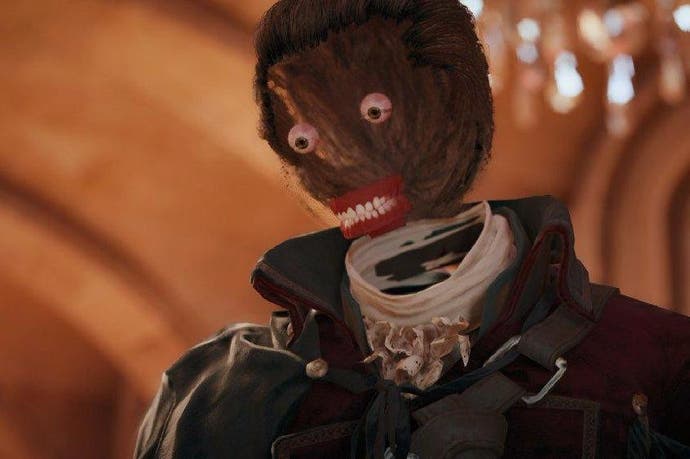Blowing the lid off the Ubiverse conspiracy
Can you handle the truth?
It all starts with Assassin's Creed IV: Black Flag.
The game's sort-of villain, Olivier Garneau, disappears around halfway through a trip to meet with shareholders in Chicago, as you learn from emails. The character is never heard from again. As villain arcs go, it's disorienting in its mundanity. Olivier is the boss of Abstergo Entertainment, the video game publishing arm of a vast Templar conspiracy designed to crush freedom of thought in the pursuit of order. He's far too nice to not be sinister. He's a bad man. And then, he just disappears.
(Shadowy regimes are good at 'unexplained disappearances' - see also Agatha Christie, Brendan Fraser.)
Players wouldn't find out what happened to him until the release of Watch_Dogs seven months later. It is set in Chicago, Garneau's fateful destination, and is under the control of a complex city-management and surveillance system provided by the Blume corporation - as documented on marketing emails lurking within Abstergo's servers. Aiden Pearce, the worst leading man of all time, is contracted by "the Brotherhood" to kill Garneau, and does so, definitively explaining the character's unceremonious departure from the previous game in the process. There's little room for interpretation. The intent is very clear.
Clear until you listen to Darby McDevitt, Black Flag's lead writer, who insists that this crossover - in which a character from one game announces their departure to the host city of another, arrives, and is killed off by the other game's protagonist - is little more than an Easter egg. A joke. A simple gag.
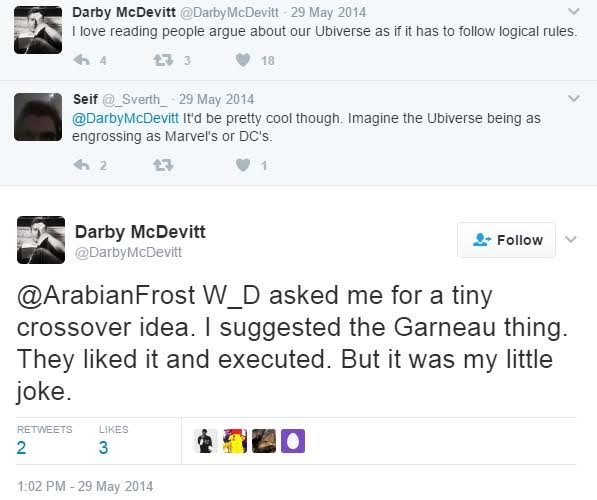
(There are no simple gags. Jokes were invented by Shakespeare to obfuscate the truth, allowing him to be critical of the Tudor regime in a way that would be imperceptible to the thickos, and the targets. Shakespeare knew how to play dangerous propaganda games with a ruling class. And his name wasn't even Shakespeare, but that's another article. Eurogamer has asked me to stay on topic, because Eurogamer is a bunch of establishment shills, who won't even let me link to my ultra-subversive truth blog and Morrissey fan site, Heaven Knows I'm On To Them Now dot tumblr dot com.)
And this is where the rabbit hole is lined with tin foil, and roasted at gas mark LIES. After quite overtly establishing a shared universe between two of its major franchises, Ubisoft backed away from the idea, with Darby McDevitt leading the charge, dismissing any evidence of narrative bleeding between their properties as "Easter eggs".
"Easter eggs" are the original Alternative Facts. You can't say things without meaning things. Besides, neither Black Flag or Watch_Dogs came out at Easter, so who exactly are the people of Ubisoft trying to kid here?
Themselves, apparently. The list of Assassin's Creed references peppered throughout the publisher's other games is huge. Far Cry 3's "Lost Expedition" DLC has you exploring an abandoned Abstergo facility, with Abstergo crates featuring Abstergo logos dotted about the place, like Hundreds & Thousands of truth smothering bitter propaganda-flavoured ice cream with a swirl of Alternative Facts. As if someone was trying to tell us something. Something like "these games all share the same universe". So why is Ubisoft messing with the public, by confirming the shared universe theory with its actions while rubbishing it on Twitter and such? This is where I, D.I. Ezio, enter the ballroom... to dance deftly (like a gazelle!) with their naughty fibs, to beam the light of truth upon them with a righteous glitterball of veracity! (This is a metaphor, as a full-sized glitterball is too cumbersome for field operations and would be a weapon of unreliable trajectory.)
(I've checked.)
Consider the upcoming Tom Clancy's Ghost Recon Wildlands, or Reaganism: The Game, in which players are tasked with infiltrating a rogue narco-state to crush a drug cartel and restore order. An objective which falls conveniently in line with that of the Templar organisation from Assassin's Creed, and with that of the Blume corporation from Watch_Dogs.
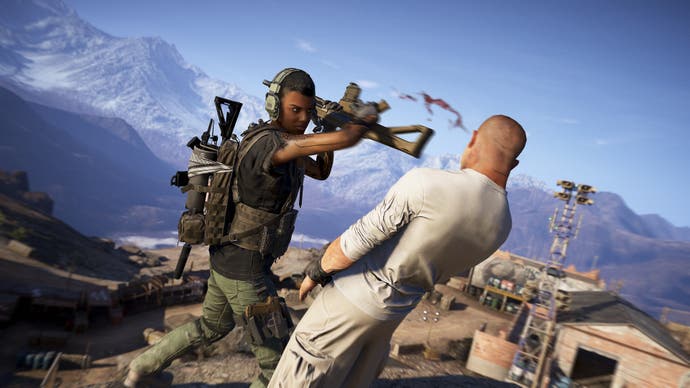
Or Tom Clancy's The Division, in which players are tasked with restoring order to a bioweapon-ravaged New York, seemingly via the method of walking around it with a gun and shooting any desperate survivors encountered. New York appeared in Assassin's Creed 3, back when the city was just a church and some wooden shacks. The fact that the same location happens to exist in both strands is, we're expected to believe, just a coincidence? I think not.
Admittedly this logic also makes the case for Spider-Man being part of the Assassin's Creed universe, but he obviously isn't because that would be stupid. (You have to be really smart to properly separate what is stupid from what intentionally looks stupid to throw people off the scent.)
Ever since Black Flag, Ubisoft has exhibited a desire to include itself in its own fiction as part of a vast meta-narrative. Ubisoft games are seen on shelves in Ubisoft games. In Watch_Dogs 2, you can hack into the surveillance of Ubisoft San Francisco and observe, among other things, the development of the next Assassin's Creed game.
Within Assassin's Creed itself, Assassin's Creed games exist - products of Abstergo Entertainment, a front for an operation in which they are mining history for clues as to the location of Pieces of Eden, artifacts from the first civilisation which can control the minds of human beings.
I believe there are factions within Ubisoft who are trying to spill the beans about all this, which would explain the discrepancies between its released content and its official policy. The fictional conflict between the Assassins and the Templars would seem to be an artistic expression of these internal divisions. The meta-narrative has folded in on itself, as meta-narratives are wont to do, causing Ubisoft the corporation to unwittingly depict its own internal propaganda wars within its own fictions. Messages are being heard by those with the will to listen.
Do you have the will to listen?
So ask yourself: who silenced Darby McDevitt? Did he defect from the pro-Ubiverse faction? He wrote half of the crossover which sits at the nexus of this tangled web, and is now our chief source of condemnation for the very idea of crossovers. One must ask why - why cover it up? Why deny what has already been perfectly established?
The dots are there to be joined, but the connections are being hidden, erased, or denied. There is a grand plan afoot, and the big picture is being obscured. But if you know where to look, there is one piece of evidence which blows the master plan wide open.
The robot in Grow Home has no joints.
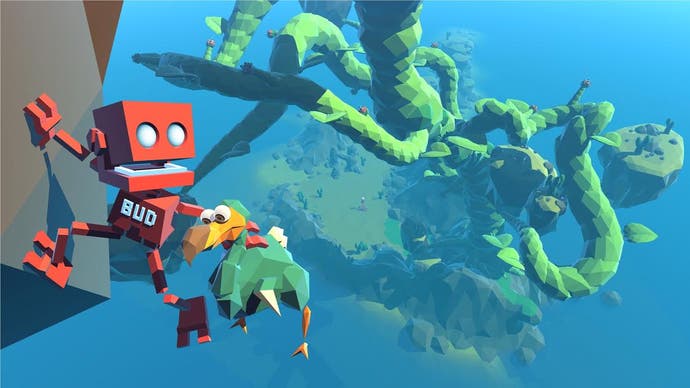
No, seriously. Look at it. Look at BUD. How do his limbs stay together? There's nothing to hold them in place. Just empty space where his elbows and knees should be. That shin should be hurtling toward the ground with the rest of his unjoined pieces. And yet.
What on earth does BUD have to do with the Ubiverse? Well, aside from the fact that he's in a game about climbing stuff (just like Assassin's Creed, Prince of Persia) and growing stuff (just like Ghost Recon Wildlands, sort of), he works in the service of an advanced shipbound artificial intelligence called MOM.
But MOM may not be so artificial. Back to Black Flag. In ACIV, it is established that the consciousness of Juno, a long-dead member of the "first civilisation" and effectively a god, is living inside the internet. She even appears to us as one point.
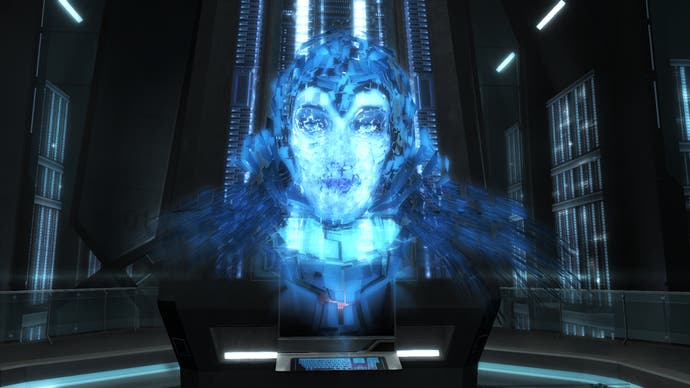
She insists that her mission is to save the world, to keep humanity. In Roman mythology, Juno is a goddess with the role of protector. She cares for the earth as a mother would care for her children, as MOM cares for BUD. The coincidences are too pointed to ignore.
BUD's lack of visible joints is absurd, but not as absurd as Rayman's complete lack of limbs. Canonically, Rayman exists in a fantasy world - 'The Glade of Dreams'. And who would dream of a world without arms, but a protector of the earth?
(This is an elaborate pun.)
The Ubiverse has existed, quietly, for quite some time. Believe me. It starts with the dream of a deity, and ends with the audacity of men to conceal gods. Something dastardly is happening behind the code, underneath the towers we are forced to climb to unlock bits of the map and that. (Forced to climb! For knowledge which should be free! The nightmare that conspires against us makes jokes at our expense!)
In amongst this tangle, there's a mission in Assassin's Creed 2 where you batter the Pope. Even the wildest musings of truth-teller supreme Dan Brown did not go as far as having Tom Hanks battering the Pope. (Although I rate Hanks and I believe he would have aced that scene. The man can make anything look real.)
What are to deduce from this? We know that every Ubisoft game occurs in the same universe, but THEY don't want to admit it. We know that it started decades ago with the fantasies of a Roman goddess. And, we know that Tom Clancy is still releasing video games, despite having died three years ago. Veeeery convenient, that. Whatever is behind this, it's big. It's so big that you can't even see it. It's like that bit at the end of Men in Black with the marbles, except that was whimsical and this is really serious and grown up and important.
While the world is distracted by trivialities, only I am willing and able to slice the throat of conspiracy with the hidden blade of justice.
But alas, I can't devote all my time to blowing this wide open as I am a Cambridge-based barista. So if you could just donate to the cause over at patreon.com/[REDACTED] that would be smashing. If I get to twenty quid a month I'm going to start making those coffee cups that change colour when you put hot water in them.
Yours in resistance,
D.I. Ezio
